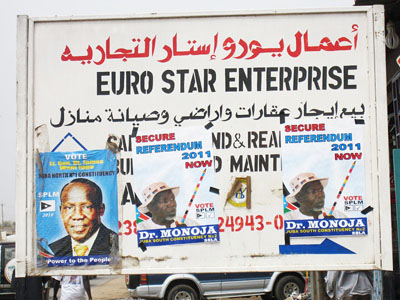
JUBA, Southern Sudan – “So far in southern Sudan we don’t have ruling parties. Who voted for these people [who currently lead the Government of Southern Sudan]?” asked a representative of an opposition party at a political parties’ summit organized by the African Union in Juba on March 1-2. The summit gave parties competing in the upcoming nationwide elections the chance to discuss concerns they have with the electoral process in the South and to engage in discussion with each other and with the South’s ruling party, the SPLM. In several sessions, opposition parties and members of the SPLM who have opted to run as independent candidates were empowered to raise issues directly not only with the African Union High Level Implementation Panel on Sudan, but also with Riek Machar, vice president of the Government of Southern Sudan and a leading member of the SPLM.
Although Machar technically represents one of the political parties competing in the elections, he also represents the southern government, so opposition party members were particularly interested in directing questions at him. Interestingly, one of the sessions focused less on electoral procedures and more on issues concerning the South in general, churning up heated questions of the moment, including rumors of a possible delay of the elections, and concerns that the referendum would subsequently be pushed back. The discussion between opposition members and the GoSS vice president was a fairly open dialogue. Alex de Waal (who is currently working with the African Union High Level Implementation Panel on Sudan) aptly describes the significance of this summit:
The summit meeting was remarkable. It brought the contending party leaders in the south into the same room. Even two weeks ago, the SPLM leadership was insisting that Lam Akol, the leader of SPLM-DC, would not be permitted to campaign in southern Sudan, and there was also acrimony between the SPLM and many independent candidates. The SPLM leadership has not yet agreed to sit around the table with SPLM members who are running as independents, but over the last two days it was ready to discuss at length with all the other political parties putting up candidates in southern Sudan, including Lam Akol’s SPLM-DC. Several of these parties made specific complaints in the meeting, about violations of their freedom to campaign, arrest and detention of their members and agents, and confiscation of their materials. The Vice President of the Government of Southern Sudan, Riek Machar, listened patiently to these points, responded to many, and promised to take up others. Given the polarization that loomed, the cordial atmosphere in the summit was extraordinary.
At the conclusion of the summit, all of the political parties contesting in the elections in southern Sudan – a total of 17 rival groups – signed an Electoral Code of Conduct. To read the Electoral Code of Conduct and the Declaration of Common Commitments (related to broader Sudan issues such as CPA implementation), visit the Making Sense of Sudan blog. Watch Enough Said and Making Sense of Sudan for updates as the AU Panel continues to work with political parties in the South to ensure implementation of the Electoral Code of Conduct and encourage a free and fair electoral process.
It is worth noting that while this initiative is an impressive step in the right direction and that all of the political parties competing in the South should be recognized for the achievement, the elections are less than 50 days away; it is a shame that this and other efforts to encourage and promote a democratic electoral process in Sudan were not undertaken (or permitted by the ruling parties) earlier in this process.

